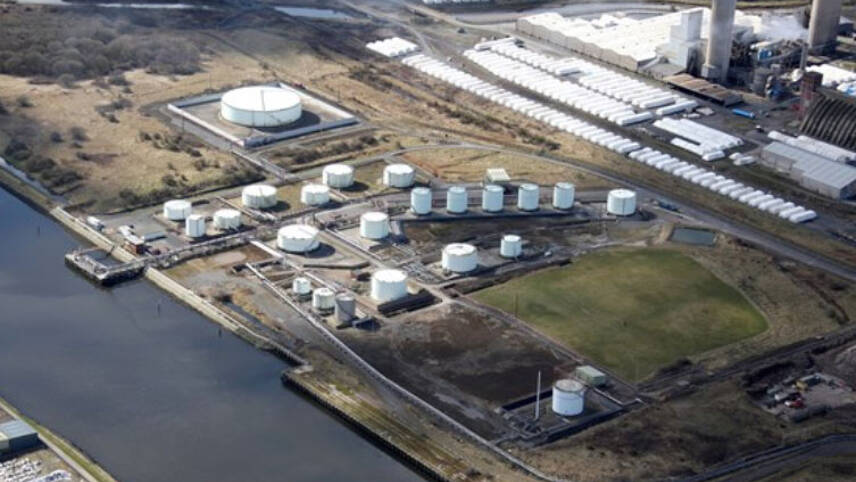Register for free and continue reading
Join our growing army of changemakers and get unlimited access to our premium content

Image: Department for Transport. Pictured: An artist's impression of the hydrogen hub.
The UK Government set out a vision for the Tees Valley to become the nation’s first hydrogen transport hub in 2020.
In a step towards delivery, the Department for Transport (DfT) announced the £7m funding package for fuel distributer Exolum on Tuesday (17 January).
This finance will be used to develop a publicly accessible refuelling station near Middlesborough which will provide green hydrogen, generated by running water through electrolyser systems powered with renewable electricity, to HGVs.
Initially, the hub will have the capacity to serve at least 25 HGVs each day. It is hoped that it will enable large multinationals and local businesses alike to make the switch from diesel HGVs to hydrogen fuel cell alternatives, which produce no tailpipe greenhouse gas emissions and also contribute to reductions in air pollution.
Exolum’s scheme is one of three local hydrogen projects backed with DfT funding under its second round of backing for the Tees Valley Hydrogen Transport Hub. Last August, the Department confirmed a multi-million pound investment supporting up to four additional public refuelling stations for HGVs, plus hydrogen-powered ground support vehicles at Teesside International Airport. At that time the UK had just four operational hydrogen HGV refuelling stations open for public use.
Technology and Decarbonisation Minister Anthony Browne said: “It’s fantastic to see the Tees Valley continue to be a trailblazer in this vital technology to decarbonise heavier vehicles – leading the way for the wider rollout of green hydrogen.
“These three winning projects will not only support jobs and economic growth in the Tees Valley but will also help decarbonise our transport network.”
Transport has been the UK’s highest-emitting sector since 2016, when it overtook power generation due to the phase-down of coal. Road transport accounts for the lion’s share of the sector’s emissions.
Hydrogen skills focus
In addition to confirming the funding for hydrogen transport infrastructure in the Tees Valley region, the DfT is also financially supporting efforts to build a local base of skilled workers.
Ministers have confirmed a £300,000 package to be allocated to local colleges and training providers, intended to enable them to purchase hydrogen training equipment and, in turn, run practical hydrogen courses for existing workers and young learners alike.
Educational organisation will need to apply to the Government for a share of the funding, which will be allocated on a competitive basis.
Tees Valley Mayor Ben Houchen said: “As more of these major projects are confirmed, it’s also essential that we develop skills in our workforce so this funding is vital to ensure local people can take advantage of the well-paid jobs this new technology is bringing.”
The UK Government has not updated its overarching skills strategy since legislating for net-zero by 2050 back in 2019. Businesses, academics and opposition policymakers have been urging the Government to rectify this ahead of a general election.


Looks like the astounding rate of progress made with battery technology will make this redundant before it is built. The cost of hydrogen production from renewable electricity will always be substantially higher than the cost of production of the renewable electricity. Put it straight into the HGVs battery. There are quite a few HGVs already on the market.
This is only the second part of the story. It all goes back to the generation of green hydrogen, ie from electrolysis.
Quite right, but the electricity to power the electrolytic process has to non-carbon, so probably not natural gas generation.
Wind wave and solar are all not under our control, leaving nuclear the option.
But lots of people do not like nuclear (little knowledge I fear, but I spent 35 years with it, great stuff).
The whole story is vital, every time!!!!
And Mr. Munford is quite correct, battery know-how is vital.